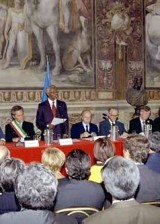Earlier this month the International Criminal Court (ICC) handed down its first verdict, finding former rebel leader Thomas Lubanga Dyilo guilty of conscripting and using child soldiers in the Democratic Republic of Congo.
This historic verdict was over three years in the making, and comes just before the court celebrates its 10 year anniversary in July of this year. While this marks a critical milestone in the international justice movement, the court’s critics and supporters alike point out there is much room for improvement, not least in the length of time required for the ICC to deliver justice.
But the ICC is just a component of a larger system of international justice, notes Phakiso Mochochoko, head of the Jurisdiction, Complementarity, and Cooperation Division of the ICC, in ICTJ’s last podcast in our series on complementarity. In fact, “the first line of defense for ending impunity is that of states.”
The Rome Statute "created a system of international justice, with national judicial systems being at the center of this as the first bulwark against impunity," he explains. “The ICC is intended to work with national judicial systems and to intervene only if and when such national judicial systems are either unwilling or unable generally to prosecute.”
Under this rubric, he says, a crucial part of the ICC’s mandate is to work with national judicial systems, ensuring they are able to carry out investigations and prosecutions of war crimes and crimes against humanity. We can look to the International Crimes Division of Uganda’s High Court as an example.
“We have worked with the Ugandan authorities, sharing our experiences and information with them and showing them at least how to handle cases of this magnitude. And this has resulted in the war crimes tribunal in Uganda being able to investigate and prosecute one of the criminals in Uganda.”
The global struggle against impunity relies on a frontline of national judicial systems willing and able to prosecute war crimes, crimes against humanity, and genocide. “We have talked enough about complementarity that there are enough people who understand it,” Mochochoko concludes. “It is now time for action.”
Listen to the podcast:
[Download](/sites/default/files/Mochochoko_ICTJ_Podcast_03202012.mp3) | Duration: 10:17mins | File size: 5.88MBPhoto: Secretary-General Kofi Annan speaks at the opening ceremony of the signing of the Rome Statute establishing the International Criminal Court, Rome, 18/07/98. UN# 199398C UN/DPI/E/Schneider.
